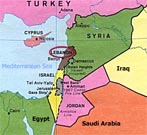Lebanon's feuding leaders still bickering in Doha
 Beirut - Lebanon's feuding parties who were holding talks in the Qatari capital Doha for the fourth consecutive day on Monday "did not find a tangible way yet to solve" the political crisis prevailing in Lebanon.
Beirut - Lebanon's feuding parties who were holding talks in the Qatari capital Doha for the fourth consecutive day on Monday "did not find a tangible way yet to solve" the political crisis prevailing in Lebanon.
According to a delegate attending the talks, "Qatar Prime Minister Hamad Ben Jassem Ben Jaber Al Thani exerts every possible effort in order to bring Lebanese reconciliation efforts to a successful end."
"In this purpose, the Qatar premier submitted detailed proposals to the Lebanese bickering leaders last night and held with them talks in the early morning hours," the delegate added.
But a source in the Lebanon parliamentary majority told Deutsche Presse-Agentur dpa "that the first morning hours registered a slight progress regarding the suggested solution to put an end to the Lebanese crisis."
According to the Lebanese National News Agency, "a package deal is expected to be announced in Doha today. It should include the election of army commander General Michel Suleiman (as president) as a first priority, formation of a national unity government and finding a formula for Hezbollah arms."
The most important points in these proposals are forming a government constituted of 30 ministers in which the majority would have 13 ministers, the opposition would have 10 ministers and the newly elected president would appoint the seven remaining ministers.
The Hezbollah-run al-Manar television channel said the opposition will make an official statement regarding the Qatari proposal on the makeup of the new government.
A delegate at the talks told dpa that currently both the rival camps are holding talks with their delegations to consider on the Qatari proposal.
Qatar also suggested the approval of a general elections law. The suggested elections would be held in 2009 and the law was drafted by a committee of judiciary and constitutional experts.
However, the fate of the arms of the Hezbollah militant movement is still unclear. The delegates did not clarify whether Sheikh Hamad Ben Jassem Ben Jaber Al Thani submitted a clear suggestion regarding the coalition's demand that it get clear guarantees that Hezbollah will not use its arms against opponents in Lebanon.
Sources close to the majority told dpa that the dialogue until now tackled nothing but the simplest points and the issues that both parties could agree upon regarding the electoral law and the possibility of forming a national union government.
The Hezbollah arms issue was not discussed in depth, the sources said.
According to Lebanese daily newspapers, Sunday witnessed tough talks after Christian opposition member General Michel Aoun threatened to leave Doha and return to Beirut because the tide had turned in favour of the majority camp.
According to the London-based al Hayat newspaper, Qatar's emir "telephoned Syrian President Bashar al-Assad and Iranian officials seeking their help in order to make the Doha dialogue a success."
The Lebanese opposition is backed by Syria and Iran, while the ruling majority is backed by Washington, Europe and most Middle East countries, including Egypt and Saudi Arabia.
Lebanon has been engulfed in an 18-month political crisis that has threatened the country with a new civil war. (dpa)